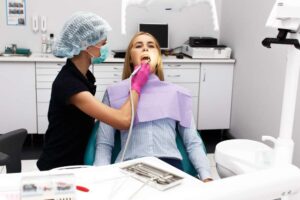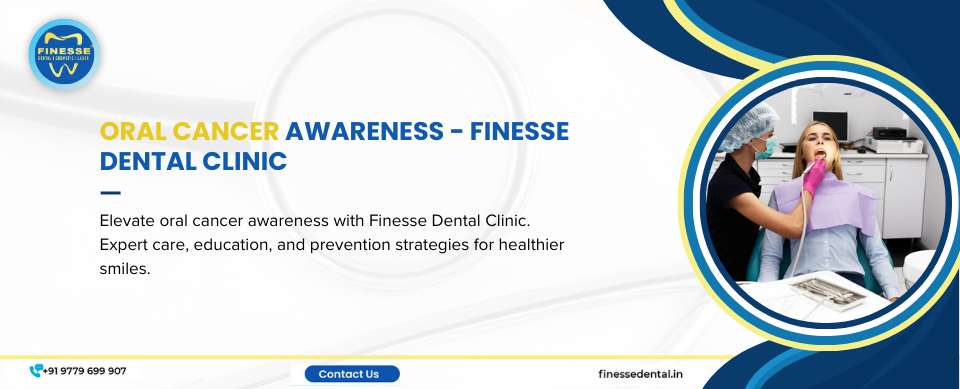- May 18, 2024
- Comment: 0
- Blog
Oral Cancer Awareness - Finesse Dental Clinic
Your smile is a powerful tool for communication and self-expression. But did you know that oral cancer, a potentially life-threatening disease, can threaten the health of your mouth and throat? This blog from Finesse Dental Clinic aims to empower you with knowledge about oral cancer, from understanding the risks to taking preventive measures.
Early detection and treatment are critical, and in some cases, may involve the expertise of oral and maxillofacial surgeons. These specialized dentists have advanced training in diagnosing and treating oral cancer, often performing reconstructive surgery after treatment to restore function and aesthetics to the face and mouth.

Understanding Oral Cancer
Oral cancer refers to the abnormal growth of cells within the mouth and throat. These cancerous cells can develop anywhere in the oral cavity, including the tongue, lips, gums, cheeks, roof, and floor of the mouth, as well as the tonsils and throat. While early detection and treatment significantly improve the chances of successful management, oral cancer can be life-threatening if left undiagnosed.
Risk Factors
Being aware of the factors that increase your risk of developing oral cancer is crucial for taking preventive measures. Here are some of the most common risk factors:
- Tobacco Use: Smoking cigarettes, cigars, or pipes, and chewing tobacco (including smokeless tobacco) are some of the leading risk factors.
- Heavy Alcohol Consumption: Excessive alcohol consumption, particularly when combined with tobacco use, can dramatically increase your risk.
- Human Papillomavirus (HPV) Infection: Certain strains of HPV, particularly HPV 16 and 18, are linked to an increased risk of oropharyngeal cancer, a type that affects the tonsils and throat.
- Sun Exposure: Exposure to ultraviolet (UV) radiation from the sun can increase the risk of lip cancer.
- Diet: A diet low in fruits and vegetables and high in processed foods may contribute to a higher risk.
- Weakened Immune System: Individuals with weakened immune systems, such as those with HIV/AIDS or undergoing organ transplantation, are at a higher risk.
- Genetics: While uncommon, certain genetic mutations can increase susceptibility to oral cancer.
Oral Cancer Symptoms
Early detection is critical for successful treatment. Here are some potential warning signs and symptoms to be aware of:
- Mouth Sores: A persistent mouth sore that doesn’t heal within two weeks, especially on the tongue, lips, or inside the cheek, can be a cause for concern.
- Lumps in the Mouth or Neck: A lump or mass in the mouth, cheek, jaw, or neck can be a symptom of oral cancer.
- Bleeding in the Mouth: Unexplained bleeding in the mouth, especially from the gums, can be a sign.
- Loose Teeth: Teeth that become loose or fall out without any apparent reason can be a symptom.
- Difficulty Swallowing: Pain or difficulty swallowing can be an indicator of oral cancer.
- Changes in Voice: A hoarse voice or change in voice quality can be a warning sign.
- White or Red Patches: Development of white or red patches inside the mouth can be a potential symptom.
Remember, not everyone with these symptoms will have oral cancer. However, if you experience any of these signs, schedule an appointment with your dentist for a proper diagnosis.
Oral Cancer Awareness
Early detection is the key to surviving oral cancer. Here’s what you can do to raise awareness and promote early detection:
- Schedule Regular Dental Checkups: Visiting your dentist for regular checkups and cleanings allows them to examine your mouth for any signs of oral cancer. The American Dental Association recommends dental checkups at least once a year, and more often if you have any risk factors.
- Perform Self-Examinations: Regularly examining your mouth for any unusual changes can help identify potential problems early on. Look for any lumps, sores, white or red patches, or bleeding.
- Talk to Your Dentist About Risk Factors: Discuss your individual risk factors with your dentist and understand any specific precautions you might need to take.
- Spread Awareness: Talk to your friends and family about the importance of oral cancer awareness and encourage them to schedule regular dental checkups and perform self-examinations.
Oral Cancer Prevention
While there’s no guaranteed way to prevent oral cancer, several lifestyle modifications can significantly reduce your risk:
- Quit Tobacco Use: Quitting all forms of tobacco use is the single most effective step you can take. If you need help quitting, talk to your doctor or dentist about smoking cessation programs and resources.
- Limit Alcohol Consumption: Moderate your alcohol consumption. Aim for no more than one drink per day for women and two drinks per day for men, as recommended by the American Cancer Society.
- Maintain a Healthy Diet: Eat a balanced diet rich in fruits and vegetables, which provide essential vitamins and antioxidants that can help protect your cells from damage.
- Protect Your Lips from the Sun: Use lip balm with SPF 30 or higher to shield your lips from sun exposure.
- Practice Safe Sex: Vaccination against HPV can help reduce the risk of HPV-related oropharyngeal cancer.
- Maintain Good Oral Hygiene: Brushing your teeth twice a day, flossing daily, and visiting your dentist regularly for cleanings and checkups can help remove potential irritants and allow your dentist to identify any precancerous lesions early on.
Oral cancer is a serious health concern, but with awareness and proactive measures, you can significantly reduce your risk. Early detection is crucial, so prioritize regular dental checkups, perform self-examinations, and maintain a healthy lifestyle.
Finesse Dental Clinic: Your Partner in Oral Health
At Finesse Dental Clinic, we are dedicated to your oral health and well-being. We believe that knowledge empowers you to make informed decisions about your health. Our team of experienced dentists provides comprehensive oral cancer screenings as part of your routine dental checkup. This includes a visual examination of your mouth, throat, and neck, as well as palpating for any lumps or abnormalities.
If you have any concerns or questions about oral cancer, don’t hesitate to schedule an appointment at Finesse Dental Clinic. We are here to provide you with the information and personalized care you need to maintain a healthy mouth and a confident smile.

